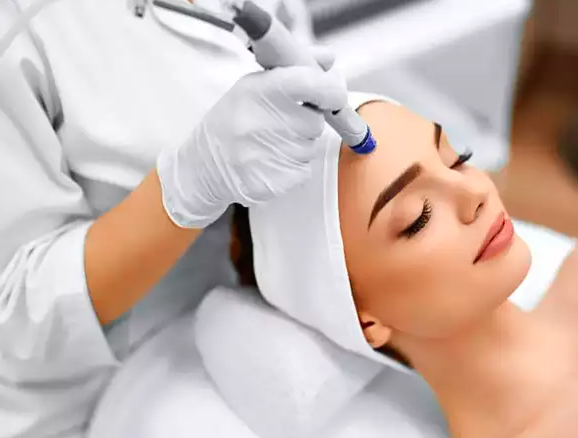Face facials have grown popular across the world, becoming a key part of many people’s skincare routines. More than just a luxury spa treatment, facials are crucial for maintaining skin health. With a wide array of facials available, it’s easy to find a type that suits specific skin needs, from cleansing and exfoliation to hydration and anti-aging. In this guide, we’ll cover the essentials about face facials, including their benefits, various types, frequency, and tips for getting the most out of your facial treatments.
What Exactly is a Face Facial?
A face facial is a multi-step skincare treatment designed to cleanse, exfoliate, and nourish the skin. Generally done by skincare professionals, facials can include a combination of cleansing, exfoliation, extractions, masks, and moisturizing, with each facial type tailored to meet individual skin requirements. Facials can work wonders for skin health by enhancing moisture levels, improving skin tone, and even providing relaxation and stress relief.
Facials not only give your skin a refreshed and radiant look but also help tackle a range of skin issues, from acne and dryness to signs of aging. Whether you’re looking for a quick pick-me-up or a deeper treatment, a facial can be the right solution.
Benefits of Face Facials
Face facials offer numerous benefits for skin health and appearance. Let’s look at the primary advantages of incorporating regular facials into your skincare regimen:
- Deep Cleansing: Facials involve thorough cleaning steps that go deeper than regular at-home cleansing routines. This process helps remove impurities, bacteria, and sebum from the pores, preventing acne and other skin issues.
- Exfoliation: Exfoliating treatments in facials help slough away dead skin cells, promoting cell renewal and giving the skin a fresh and vibrant look.
- Hydration Boost: Facials usually include moisturizing elements that replenish the skin’s moisture levels, which is essential for soft, supple skin.
- Improved Circulation: Massage techniques used during facials help boost blood circulation, bringing oxygen and nutrients to the skin’s surface, which results in a healthy, natural glow.
- Anti-Aging Properties: Specialized facials for anti-aging help reduce the appearance of fine lines and wrinkles by stimulating collagen production.
- Detoxification: Facials can help eliminate toxins and impurities, especially when certain ingredients like clay masks or antioxidant-rich products are used.
- Relaxation and Stress Relief: The soothing experience of a facial can help reduce stress, which has benefits for both mental health and skin health, as stress can exacerbate skin conditions like acne and eczema.
Types of Face Facials
Not all facials are the same; various types are available to meet different skincare needs. Here are some of the most popular face facials and their unique benefits:
1. Classic Facial
A classic facial, often referred to as a European facial, is the most common type of facial and suits nearly all skin types. This facial usually includes cleansing, exfoliation, extractions (if needed), a mask, and a moisturizing treatment. It’s a great option for those looking to maintain their skin’s health and keep it clean and hydrated.
2. Anti-Aging Facial
Anti-aging facials focus on improving skin elasticity and firmness, making them ideal for mature skin. Ingredients rich in antioxidants, collagen, and peptides are commonly used, which help combat fine lines and wrinkles. Additionally, techniques like facial massages and LED therapy may be incorporated to stimulate collagen production.
3. Acne Facial
Acne facials are designed specifically for those with acne-prone or oily skin. This type of facial involves deep cleansing, exfoliation, and extractions to help clear clogged pores and reduce the appearance of acne. Acne facials typically incorporate antibacterial ingredients, such as salicylic acid and tea tree oil, to reduce inflammation and prevent future breakouts.
4. Brightening Facial
If you’re dealing with uneven skin tone, dullness, or dark spots, a brightening facial might be a great choice. Brightening facials often contain ingredients like vitamin C, glycolic acid, and fruit enzymes, which help fade discoloration and boost radiance.
5. Hydrating Facial
Hydrating facials are ideal for dry or dehydrated skin. This facial focuses on delivering moisture to the skin through hydrating masks, serums, and creams. By the end, your skin should feel refreshed, soft, and deeply moisturized.
6. Collagen Facial
Collagen facials aim to restore the skin’s elasticity by stimulating collagen production, which can help make the skin look firmer and more youthful. These facials are popular among those seeking anti-aging solutions, as they can help reduce the appearance of fine lines.
7. Microdermabrasion Facial
Microdermabrasion is an advanced exfoliation treatment that involves using a device to gently remove the top layer of dead skin cells. This facial helps improve skin texture, reduce the appearance of acne scars, and make the skin look brighter.
How Often Should You Get a Facial?
The frequency of facials depends on your skin type, goals, and budget. Here’s a general guideline for how often you should consider getting a facial:
| Skin Type | Recommended Frequency |
|---|---|
| Normal/Combination | Every 4–6 weeks |
| Oily/Acne-Prone | Every 2–4 weeks |
| Dry/Sensitive | Every 6–8 weeks |
| Mature | Every 4–6 weeks |
Regular facials can be beneficial in maintaining the skin’s health, but overdoing them might lead to irritation, especially for sensitive skin types.
Key Ingredients in Face Facials
Different facial types utilize specific ingredients to address unique skin concerns. Below are some common ingredients used in facials and their benefits:
- Vitamin C: An antioxidant that brightens and protects against free radicals.
- Hyaluronic Acid: Boosts hydration and retains moisture in the skin.
- Glycolic Acid: Exfoliates and promotes cell turnover.
- Salicylic Acid: Effective for acne treatment; it unclogs pores and reduces inflammation.
- Peptides: Help in firming the skin by boosting collagen production.
- Charcoal and Clay: Detoxify by drawing out impurities from the skin.
Step-by-Step Facial Process
Here is an outline of the general steps involved in a professional facial treatment:
1. Consultation
The process typically starts with a skin consultation, where the aesthetician assesses your skin type, concerns, and goals. This step is crucial for customizing the facial to your skin’s needs.
2. Cleansing
A facial begins with cleansing to remove dirt, oil, and makeup from the skin. Cleansers suited to your skin type are used to ensure the skin is thoroughly clean and prepared for the subsequent steps.
3. Exfoliation
Exfoliation involves the removal of dead skin cells, which helps improve texture and allows other products to penetrate more effectively. Physical or chemical exfoliants may be used, depending on your skin sensitivity.
4. Extractions
If you have blackheads or whiteheads, extractions may be performed to clear them. This step must be done carefully to avoid skin damage.
5. Facial Massage
Massage improves blood circulation, enhances lymphatic drainage, and promotes relaxation. It’s one of the most soothing steps in a facial and can improve the overall tone of the skin.
6. Mask Application
A mask tailored to your skin concerns is then applied. For example, clay masks are great for oily skin, while hydrating masks work wonders for dry skin.
7. Moisturizing and SPF Application
The final step usually involves applying a moisturizer and SPF to seal in the treatment and protect the skin from sun damage. Sunscreen is particularly important post-facial, as exfoliation can make the skin more sensitive to UV rays.Angelicatlol Facial This facial is celebrated for rejuvenating and revitalising the skin, making it an excellent choice for anyone seeking a radiant complexion.
Home Facials vs. Professional Facials
While professional facials provide deep cleansing and expert treatment, home facials can be beneficial for maintenance between professional treatments. Here’s a quick comparison:
| Factor | Home Facial | Professional Facial |
|---|---|---|
| Cost | Low | Higher |
| Effectiveness | Mild | High |
| Customization | Limited | Customized to skin type |
| Products Used | Over-the-counter | Professional-grade products |
| Safety and Expertise | Basic techniques | Done by trained professionals |
While at-home facials can help maintain your skin, professional facials are more effective for addressing specific skin issues.
Tips for Enhancing Your Facial Experience
- Choose the Right Facial for Your Skin: Always consult a professional to determine the most suitable facial for your skin type and concerns.
- Stay Hydrated: Drinking plenty of water after your facial will support the detoxification process.
- Avoid Makeup Afterward: Give your skin time to breathe and recover by skipping makeup for at least 24 hours.
- Apply Sunscreen: Since facials can make your skin more sensitive to UV rays, be diligent about applying sunscreen post-treatment.
- Follow a Consistent Skincare Routine: Between facials, maintain a skincare routine that includes cleansing, moisturizing, and sun
Conclusion
Incorporating face facials into your skincare routine can significantly enhance your skin’s health and appearance. With a variety of types available, each designed to address specific concerns—from acne to aging—there’s a facial for everyone. Understanding the benefits of facials, such as deep cleansing, hydration, and relaxation, can motivate you to invest in this self-care practice.
Regular facials can help maintain your skin’s vitality, making it essential to choose the right type for your needs and consult with professionals for personalized treatments. By following the recommended frequency and implementing proper skincare practices, you can enjoy the lasting effects of radiant, healthy skin. Remember, the journey to beautiful skin is not just about the treatments you receive but also about the love and care you give your skin every day. Embrace the rejuvenating power of face facials and step into a world of glowing skin.





